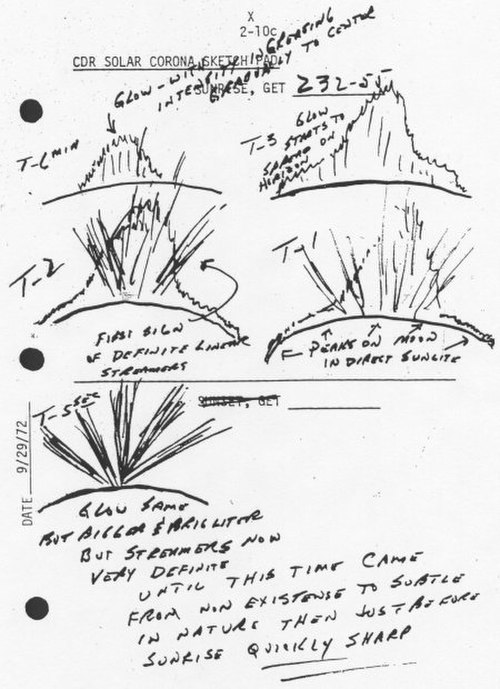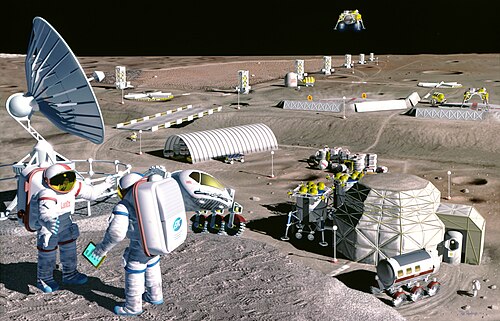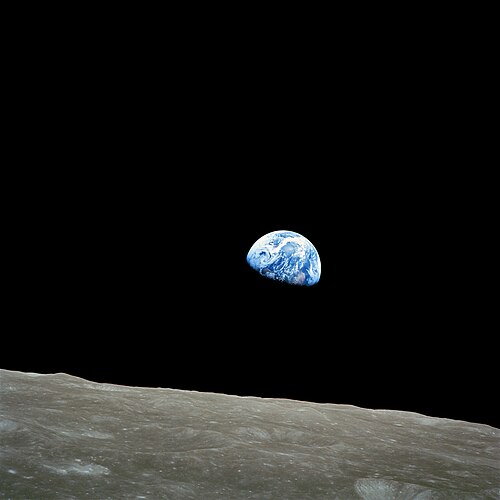Planetnoun
Each of the seven major bodies which move relative to the fixed stars in the night sky—the Moon, Mercury, Venus, the Sun, Mars, Jupiter and Saturn.
Planetnoun
(astronomy) A body which orbits the Sun directly and is massive enough to be in hydrostatic equilibrium (effectively meaning a spheroid) and to dominate its orbit; specifically, the eight major bodies of Mercury, Venus, Earth, Mars, Jupiter, Saturn, Uranus, and Neptune. (Pluto was considered a planet until 2006 and has now been reclassified as a dwarf planet.)
Planetnoun
A large body which directly orbits any star (or star cluster) but which has not attained nuclear fusion.
Planetnoun
In phrases such as the planet, this planet, sometimes refers to the Earth.
Planetnoun
A celestial body which revolves about the sun in an orbit of a moderate degree of eccentricity. It is distinguished from a comet by the absence of a coma, and by having a less eccentric orbit. See Solar system.
Planetnoun
A star, as influencing the fate of a men.
Planetnoun
any of the celestial bodies (other than comets or satellites) that revolve around the sun in the solar system
Planetnoun
a person who follows or serves another
Planetnoun
a celestial body moving in an elliptical orbit round a star.
Planetnoun
the earth
Planetnoun
a celestial body distinguished from the fixed stars by having an apparent motion of its own (including the moon and sun), especially with reference to its supposed influence on people and events
Planet
A planet is an astronomical body orbiting a star or stellar remnant that is massive enough to be rounded by its own gravity, is not massive enough to cause thermonuclear fusion, and – according to the International Astronomical Union but not all planetary scientists – has cleared its neighbouring region of planetesimals.The term planet is ancient, with ties to history, astrology, science, mythology, and religion. Apart from Earth itself, five planets in the Solar System are often visible to the naked eye.
Moonnoun
(with "the") Earth's only permanent natural satellite.
Moonnoun
Any natural satellite of a planet.
Moonnoun
(literary) A month, particularly a lunar month.
Moonnoun
A crescent-like outwork in a fortification.
Moonnoun
The eighteenth trump/major arcana card of the Tarot.
Moonnoun
(cartomancy) The thirty-second Lenormand card.
Moonverb
To display one's buttocks to, typically as a jest, insult, or protest.
Moonverb
(usually followed by over or after) To fuss over something adoringly; to be infatuated with someone.
Moonverb
To spend time idly, absent-mindedly.
Moonverb
(transitive) To expose to the rays of the Moon.
Moonverb
(cryptocurrency) to rise in price rapidly (describing a coin or token).
Moonnoun
The celestial orb which revolves round the earth; the satellite of the earth; a secondary planet, whose light, borrowed from the sun, is reflected to the earth, and serves to dispel the darkness of night. The diameter of the moon is 2,160 miles, its mean distance from the earth is 240,000 miles, and its mass is one eightieth that of the earth. See Lunar month, under Month.
Moonnoun
A secondary planet, or satellite, revolving about any member of the solar system; as, the moons of Jupiter or Saturn.
Moonnoun
The time occupied by the moon in making one revolution in her orbit; a month.
Moonnoun
A crescentlike outwork. See Half-moon.
Moonnoun
The deliberately exposed naked buttocks.
Moonverb
To expose to the rays of the moon.
Moonverb
To expose one's naked buttocks to (a person); - a vulgar sign of contempt or disrespect, sometimes done as a prank.
Moonverb
To act if moonstruck; to wander or gaze about in an abstracted manner.
Moonnoun
the natural satellite of the Earth;
Moonnoun
any object resembling a moon;
Moonnoun
the period between successive new moons (29.531 days)
Moonnoun
the light of the moon;
Moonnoun
United States religious leader (born in Korea) who founded the Unification Church in 1954; was found guilty of conspiracy to evade taxes (born in 1920)
Moonnoun
any natural satellite of a planet;
Moonverb
have dreamlike musings or fantasies while awake;
Moonverb
be idle in a listless or dreamy way
Moonverb
expose one's buttocks to;
Moon
The Moon is Earth's only natural satellite. At about one-quarter the diameter of Earth (comparable to the width of Australia), it is the largest natural satellite in the Solar System relative to the size of its planet, the fifth largest satellite in the Solar System overall, and is larger than any known dwarf planet.







































